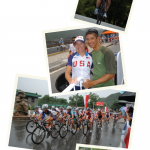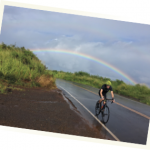“As an intern, I did a rotation in rheumatology,” he recalls. “Everyone on the rotation was happy. It seemed like they were normal people and went home at night. Also, the diseases they were treating and drugs they used intrigued me.”
In 2010, Dr. Phillips joined Jackson Purchase Medical Associates, a multispecialty group practice in Paducah, Ky., as its first rheumatologist. He says the group dissolved several years later after most of its primary care doctors began working for the local hospital. He then formed his own solo practice, called Paducah Rheumatology.
It was about that time he started competing in triathlons.
“After I broke my wrist, I was spending some time in the pool, swimming, and ran into some triathletes training in the pool,” he says. “They were competitive-minded people who got me thinking there was no reason that I shouldn’t compete in triathlons since I was doing all three sports anyway.”
He soon discovered that when he swam and cycled, he built up the muscles in his legs, which made him less prone to injuries when running. After competing in a handful of triathlons, he hired a coach in Madison, Wis.—a “hotbed” community for triathletes. Every week, they discuss his fitness and goals and tailor workouts focused on speed, strength, and/or endurance, depending on the phase of training or current race goals.
About one month before long races, he may bike 100 miles on Saturdays and then run five miles. On Sundays, he runs between 10 and 15 miles. He spends up to 14 hours each week in aerobic training, which doesn’t include time to warm up, cool down, stretch or weight train.
On the morning of a race, he’ll eat a hot bowl of oatmeal for protein and a banana for potassium, to help prevent cramps, and push fluids, such as sport drinks for electrolytes and beet juice, which he says helps improve performance. During races, he’ll ingest gel shots, which are pure glucose energy beverages.
“To a large extent, triathlons are a competition against yourself,” says Dr. Phillips. “You’re not in a pack with other people trying to see who can get to the finish line first. It’s safer since it’s more spread out over the course.”
Around the World
Over recent years, Dr. Phillips has won several races for his age group. He also competed in the Boston Marathon, three age group national championships in Omaha, Neb., and Cleveland and other races in Anchorage, Alaska, and Chattanooga, Tenn.


